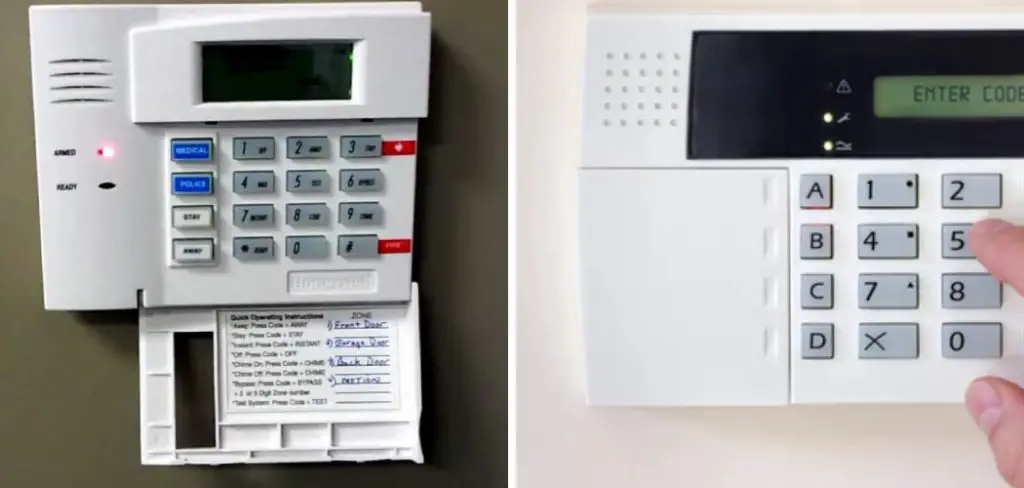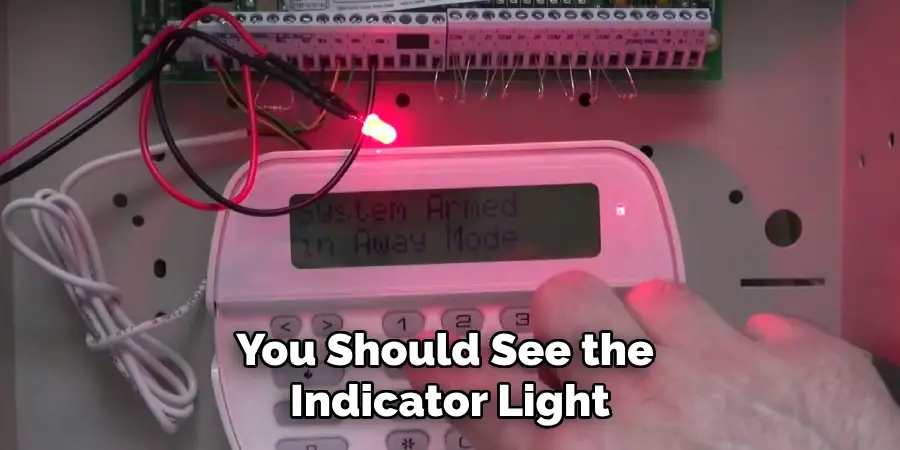Have you ever laid awake at night wondering if your alarm system would work if an intruder broke in? While we hope it never happens, preventing burglary is important for peace of mind. In this post, I’ll share some simple ways on how to test alarm system to ensure it’s functioning properly so you can sleep soundly knowing your home and family are protected.

We’ll cover how to check things like motion sensors, door/window contacts, and the main control panel, so you have confidence that if danger does strike, your alarm won’t let you down. A little preventative maintenance through occasional testing could just give you and your loved ones that extra level of safety. Let’s get started with the first test.
9 Best Ways on How to Test Alarm System
1. Testing Motion Sensors:
Motion sensors are an essential part of any alarm system, as they detect movement in your home and can trigger an alarm. To test them, walk around each room with a motion sensor, making sure to get within its range. If the sensor is working correctly, you should see the indicator light on the sensor turn on when it detects motion. If it doesn’t, you may need to change the batteries or contact your alarm company for assistance.

2. Testing Door/Window Contacts:
Door and window contacts are another crucial component of an alarm system, as they detect when a door or window is opened. To test these, open each door and window in your home one by one while the system is armed. If the alarm doesn’t go off, the contacts are working correctly. If it does, try closing and opening them again to see if the alarm goes off consistently. If there are any issues, contact your alarm company for help.
3. Testing Glass Break Sensors:
Glass break sensors detect the sound of breaking glass and can trigger an alarm in case of a break-in through a window. To test these, you can use a glass-breaking tool that mimics the sound of shattering glass. You can also try clapping your hands loudly near the sensor to see if it triggers an alarm. If not, check the batteries or contact your alarm company for assistance.

4. Testing Smoke and Carbon Monoxide Detectors:
Some alarm systems come with built-in smoke and carbon monoxide detectors, which are essential for detecting potential fires or gas leaks. To test these, press and hold the test button on each detector until it beeps or flashes. If there is no response, try replacing the batteries or contacting your alarm company. This test should be done monthly for optimal safety.
5. Testing the Main Control Panel:
The main control panel is the brain of your alarm system, and it’s essential to make sure it’s working correctly. To test this, arm your system and then enter an incorrect passcode or try to tamper with it. If the alarm goes off, everything is functioning as it should. If not, contact your alarm company for troubleshooting.
6. Testing the Alarm Siren:
The alarm siren is the loud noise that sounds when the system is triggered. To test this, arm your system and then set off an alarm by opening a door or window without disarming it. If the siren goes off, you know it’s working. If not, check the connection or contact your alarm company for assistance.
7. Testing the Backup Battery:
In case of a power outage, it’s crucial to have a backup battery that can keep your alarm system running. To test this, unplug your system from the power source and see if it continues to function with just the battery. If it doesn’t, the battery may need to be replaced. Sometimes, the battery may need to be charged before it can function properly.

8. Testing the Communication Method:
Most modern alarm systems communicate with a monitoring center through either a landline, cellular network or Wi-Fi. To test this, arm your system and then set off an alarm by opening a door or window without disarming it. If the monitoring center receives the signal and contacts you, everything is working correctly. If not, contact your alarm company for assistance.
9. Testing the Alarm Response Time:
Finally, it’s essential to test the response time between when an alarm is triggered and when the monitoring center receives the signal. To do this, arm your system and then set off an alarm by opening a door or window without disarming it. Time how long it takes for the monitoring center to contact you, and if this time is longer than expected, contact your alarm company for assistance.
Following these simple steps on how to test an alarm system can give you peace of mind and ensure that your home and loved ones are protected. It’s important to regularly perform these tests to catch any issues before they become a safety concern. Remember, an alarm system is only effective when it’s functioning correctly, so make sure to keep up with maintenance and testing for optimal home security. Stay safe!
Additional Tips and Tricks to Test Alarm System
- If you are unable to test your alarm system due to a power outage or other issues, consider contacting your alarm company for further instructions. They may have alternate methods for testing the system.
- Make sure that all sensors and detectors are properly installed and in working order before conducting a test. This includes ensuring they are free from any obstructions such as dust or debris.
- Test your alarm system regularly, at least once a month. This will ensure that it is functioning properly and help identify any potential issues before they become major problems.
- It is recommended to conduct a full system test at least once a year. This includes testing all components of the alarm system, including the control panel, sensors, and detectors.
- Familiarize yourself with the specific testing procedures for your alarm system. Some systems may require a certain sequence of buttons to be pressed, while others may have a dedicated test button.
- If you are unsure about how to test your alarm system or need assistance, do not hesitate to contact your alarm company for guidance.
- In addition to testing the alarm system itself, ensure that all backup batteries are in working order. This is especially important if your alarm system is connected to a landline, as a power outage could render the system useless.
- Consider conducting a test of your alarm system while you are away from home, such as when running errands or on vacation. This will not only provide peace of mind that the system is functioning properly but also allow you to test the response of your chosen monitoring company.
- In case of a false alarm during testing, make sure to contact your monitoring company immediately to avoid any unnecessary dispatching of emergency services.
- Stay up-to-date with any changes or updates to your alarm system’s technology and be sure to follow manufacturer recommendations for testing and maintenance.
- Finally, make sure to properly document all testing and maintenance activities for your records. This will not only help you stay organized but also provide proof of regular upkeep in case of any issues with the alarm system in the future.

By following these tips and tricks, you can ensure that your alarm system is always in proper working order and ready to protect your home or business. Remember, regular testing and maintenance are key to a reliable and effective alarm system. So, make it a priority to conduct tests regularly and address any issues as soon as they arise. Failure to do so could leave you vulnerable in case of an emergency. Stay safe and secure with a well-maintained alarm system. Happy testing!
Frequently Asked Questions
How Does an Alarm System Work?
Most alarm systems have sensors that detect motion, sound, or changes in temperature. When these sensors are triggered, the alarm system will send a signal to a monitoring center or directly to emergency services. The monitoring center will then contact you and/or dispatch authorities if necessary.
Why Should I Test My Alarm System?
Testing your alarm system ensures that it is functioning properly and can effectively protect your home or business in case of an emergency. Regular testing also helps identify any issues or malfunctions that need to be addressed.
How Often Should I Test My Alarm System?
It is recommended to test your alarm system at least once a month. Some manufacturers may recommend more frequent testing, so it’s important to check the manufacturer’s guidelines for your specific system.
What Should I Do Before Testing My Alarm System?
Before testing your alarm system, you should inform your monitoring center that you will be conducting a test. This will prevent any unnecessary dispatch of authorities. You should also make sure all family members or employees are aware of the test and know how to respond in case of a real emergency.
Conclusion
All in all,l knowing how to test alarm systems is crucial for ensuring the safety of your home or business. By regularly testing your alarm system, you can have peace of mind knowing that it will work effectively in case of an emergency. It’s also important to follow the manufacturer’s guidelines and inform your monitoring center before conducting a test.
By taking these steps, you can ensure that your alarm system is functioning properly and providing the protection you need. So, make sure to schedule regular alarm system tests to keep your property safe and secure. Remember, it’s always better to be safe than sorry when it comes to protecting your loved ones and valuable possessions. Stay vigilant and stay protected! Happy testing!
